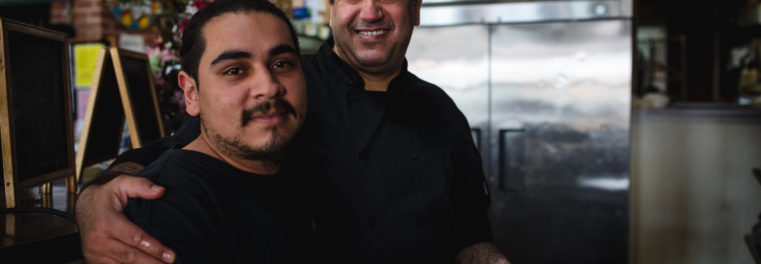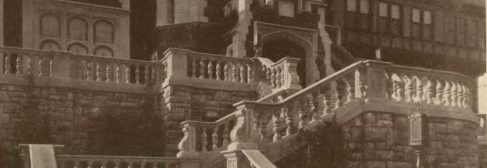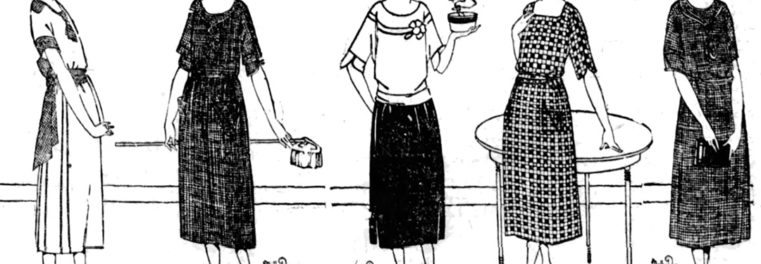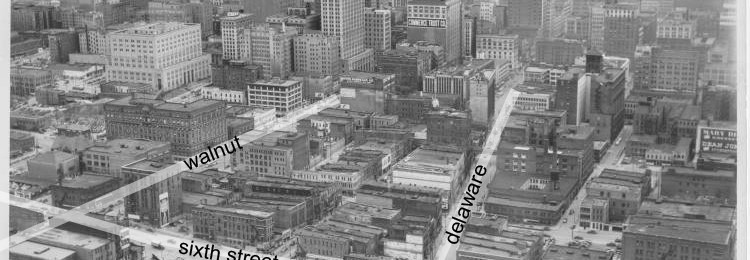Habashi House: Like Father, Like Son

I stepped out into the cold from Habashi House, a well-known River Market Middle-Eastern restaurant, and sipped on my complementary cup of tea.
“That was good,” I said, turning to my friend. “It felt like home.”
After such a delicious meal, I wasn’t sure how to share my inexplicable intrigue with the familial, nostalgic connections I was making. I mean, I didn’t just find a great place to get a gyro. I found the welcoming hearth of the Middle East right here in Kansas City, #midcoast notwithstanding.
One might easily blame the rush of emotion on my idealized and rose-tinted view of myself as a global citizen of sorts. More particularly, the tea reminded me of the dark mint tea so characteristic of the local eateries I regarded with great esteem on a previous trip to that part of the world.
But, as it turns out, the reasons for this sense of home were not as I suspected.
I interview Moody Habashi, co-owner of Habashi House. He runs the restaurant along with his sister, Mai Habashi. A genuine sort of man, he welcomes me with enthusiasm. He doesn’t lead with stories about himself or his sister, even though they’ve been the sole proprietors for nearly ten years. Nor is he eager to talk about the food, the location, or even the clientele. Instead, Moody’s eyes light with pride as he begins to talk about Tawfiq Habashi, his father.

Originally a Palestinian immigrant who moved to Irbid, Jordan, at eight years old, Tawfiq was savvy from a very young age. He opened a fabric store in his youth, and by the age of 21 owned the most successful fabric store in the city. The political unrest of the 1980s struck his business, and in just one day, he lost everything. Not to be bested by the times, Tawfiq moved again in 1989, this time to Kansas City. He went ahead of his wife and children with a goal of bringing them to the United States at the earliest opportunity. He was 57 years old. Equipped with his inherent characteristics of warmth and thoughtfulness, Tawfiq took on his next challenge. His knack for finding business opportunities led him to the newly revitalized River Quay.

Tawfiq’s entrepreneurship came at an ideal moment. Just several years before, the River Quay had finally fallen from its precarious position in the hands of the Mob. Since the 1970’s the market area had become a disputed nightlife hotspot. The lucrative potential of the prime real estate caused violent outbursts between Mob bosses, climaxing with a bombing that destroyed several bars in 1977. The Mafia footprint drastically reduced after the imprisonment of mob boss Nick Civella in 1981. By the late eighties, the city allocated $14.5 million dollars of public funds to the area. The tide was turning.
Joining the folk determined to bring the marketplace far from the bedlam of just a few years earlier, the aging Tawfiq Habashi made quick work of an opportunity once again.
“He was selling [colognes] here in the market and he was yelling, “Three for ten, no English!’” Moody recalled. “He was known for that.”

I have to wonder if it is possible to give Tawfiq enough credit for the courage and chutzpah it took to start a business considering both time and place. The River Quay history was just the first of the societal hurdles he encountered. A non-English speaking Palestinian selling foreign foods to a very limited Midwestern demographic during a recession is not a recipe for success.
The setbacks seem to have had little effect on Tawfiq’s venture. Moody related how he followed his dad to the country just 3 years later, and when he arrived, a fully functioning grocery store, lease and all, awaited him. Two months into his new life in Kansas City, Moody’s father assigned him the role of grocery store manager. Though he hadn’t learned the language yet, Moody already knew that he had his father’s intuitive business sense.
“That I got from my dad,” Moody admits. “We would tag team. When we were together, nothing could stop us.”

The 19 year-old Moody had a lot to learn. He soon began his own family, and continued to take on new responsibilities for the store that flourished at the River Market. He relates how his father’s generosity started with an intentional act at home each day, when he would brew tea, which he’d serve, impromptu, to patrons who visited the store. His hospitality made customers feel like a part of the family.
“They miss him,” Moody said of his father, who died of cancer in 2006. ” To this day we have people who cry when they walk in.”
After so many years together, the man who led by example passed on the trait. Moody Habashi noted that passersby would turn up their noses at the foreign foods in his store. So he began luring customers to purchase Middle Eastern ready-to-eat delicacies with a low price tag. He quickly learned what customers at the River Market wanted, even if they themselves didn’t know it just yet. With an ability to inspire both employee and guest, Moody took on the challenge readily.
“These days, even little kids know what falafel is. But it didn’t used to be like that. We had mostly vegetarian dishes. But people didn’t know what it was about. So we charged $2.99, just to get them to try it.”

The Habashi House restaurant opened in May 2000 with a small but successful menu that included not just vegetarian specialties like falafel and hummus, but beef too—something Moody quickly began to associate with Kansas City food preferences. And although Kansas City culture has changed significantly in the last 12 years, recent customer reviews show that even now the restaurant still attracts newcomers trying food from the Middle East for the first time.
The restaurant has since been decorated with awards from publications like The Pitch and Kansas City Star, including beating out Chipolte and Panera Bread for #1 best lunch spot in Kansas City in 2011. No wonder, with its creamy hummus, scented rice, and savory beef shwarma –all made fresh everyday from Habashi family recipes.

But for employees, the experience isn’t just about working with delicious food. It’s more about the opportunity to work for an employer whom they also describe as a mentor and friend, and one whom they credit for helping them with their own beginnings. After getting a few to talk to me, I’m told almost every employee has been at Habashi for six years or longer. Having worked in the food industry myself for eight years, this sounds like a miracle.
“I would honestly say I don’t know where I would be without him,” Nestor Javier Quintanilla, 25, admits. “I get inspired by the fact that nothing really phases him. And he’s always pushing us, his employees, to better ourselves. He is a lot like a father figure, especially for me, as I never had a father myself.”
Nestor goes on to tell me about his 18-month-old daughter, Korra, and how Moody has helped him to learn and grow in his new role. Nestor isn’t the only young man who has found a father figure in Moody.
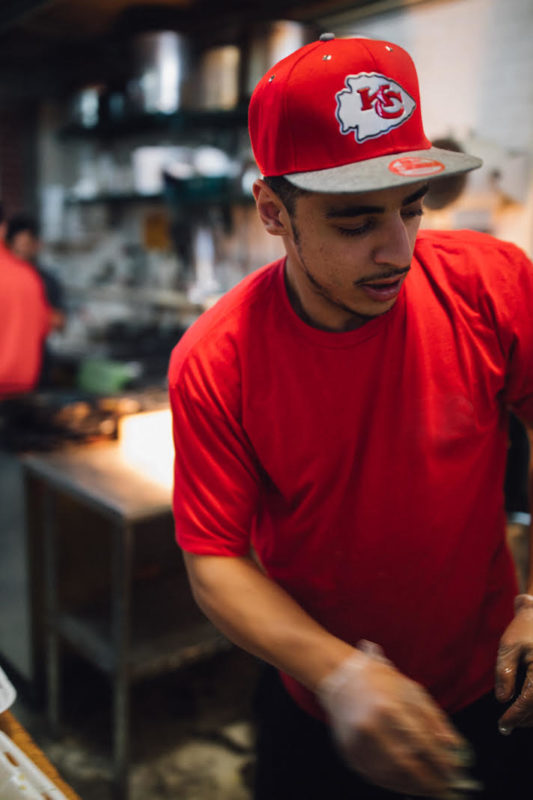
Samer Madji Ghani, also 25, describes his beginning days at Habashi House as tumultuous ones. Struggling with addiction when he was hired, Samer confesses to me that he’s not sure why Moody took him on in the first place, having full knowledge of his renegade ways. “I kept coming late because of the situation I was in. He just kept giving me chance after chance. He even bonded me out of jail.” A few mutual associates had recommended not hiring Samer at all, but Samer tells me his life has changed dramatically since joining the Habashi family.
“I could tell you stories the rest of the night,” he exclaims. “Now I’m here, six years later, about to graduate from Longview Community College with an associate degree that wouldn’t have been possible without him.”
It seems that the patriarch of Habashi House left more behind than just his business sense. I can’t help thinking that Samer and Nestor’s reflections about their employer echo Moody’s:
“I talk about my dad so much because I learned everything from him, you know?”





